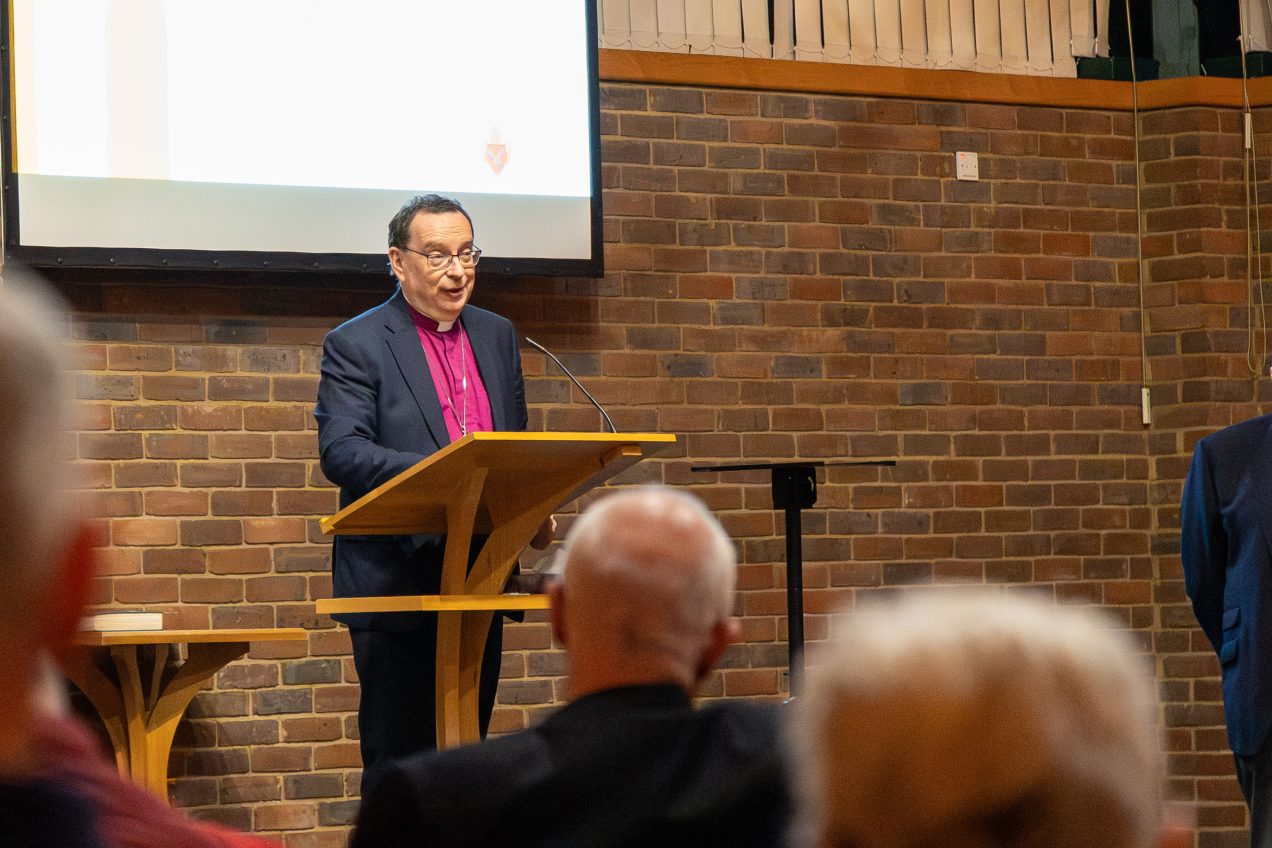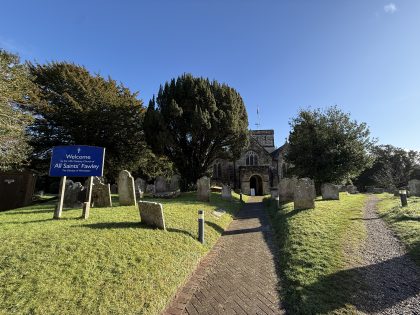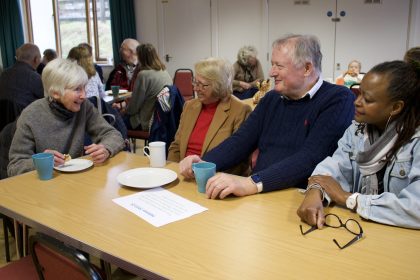A meeting of Diocesan Synod was held on 20 November 2025, at Christ Church Chineham. Find Bishop Philip’s Presidential Address below:
Normally, what I hope to do in my Presidential Address is to give Synod an overview of where I feel we are currently as a Diocese. I think it’s an important way of my holding myself accountable to you. What I want to do tonight however is slightly different. Instead, I want to brief you on three different acronyms, which may or not be familiar to you, and they are, in the order I’m going to address them: LLF, SMMIB and GAFCON. Each of them is topical and relevant to us as a Diocese. And don’t worry, I’ll spell out what each one means as we go along.
So let’s begin with LLF – which stands, as I’m sure you know, for the ‘Living in Love and Faith’ process which produced another acronym, PLF, the ‘Prayers of Love and Faith’ which the House of Bishops commended for use in existing services a year or so ago.
When I last addressed the Synod on this subject I said that I thought the process had rather run into the sand and I wasn’t quite sure where it was going. Aside from the fact that subsequent developments have rather proved me to be right, I was a little surprised to find my words being quoted in a formal question at General Synod back in July. I popped up and raised a Point of Order saying that I objected to what was essentially a pastoral comment to this Synod being rather politicised in the way it was. (It wasn’t of course a Point of Order, as the Chair gently pointed out, but it did give me the opportunity to get it off my chest!). But the point I want to make is that while this Presidential Address is a public statement it is essentially a pastoral statement, from me as your Bishop, to the Diocese of Winchester, and I think it should be treated as such.
Anyway, to continue, many of you will be aware that at the last meeting of the House of Bishops (which is one of the three Houses of General Synod) we took some decisions about LLF which have proved to be rather controversial. We took those decisions in the light of three substantial theological papers which were presented to us, along with some clear legal advice. All of that is now in the public domain and you can access the papers on the C of E website if you wish.
The effect of them all was rather sobering. The issues before us concerned how we might (or might not) give permission for ‘standalone’ services for same sex couples, and whether (or not) clergy could enter into same sex marriages. And a further factor was the clear signal, from many who could not accept that innovation, that if we did go those roads there would be a real and substantial demand for separate episcopal oversight from bishops who themselves could not accept such changes.
I think it’s important at this point to say that there were not one, but two questions in play. The first question was whether it would be right or not to make such innovations. The second however concerned how such innovation might be made – and it was the latter that was the game changer.
The arguments as to whether it would be right or not to make such changes have been well rehearsed, in this Diocese and beyond. But what the theological and legal advice did was to bring the House face to face with the sheer constitutional difficulty of making such changes. Up to now we’d been trying to find ways of making those changes, without changing our doctrine of marriage: which you might describe as an exercise in trying to have your cake and eat it. But the advice essentially ruled that out and said that if those changes were to be made they needed to be done in a constitutionally appropriate way, via formal business of the General Synod. It’s not to say those changes could not be made, but that if they were to be they should be done properly according to the norms of our governance.
There was real clarity about that, and it’s because of that real clarity, and the real lack of appetite for further differentiated episcopal oversight (bearing in mind that that is already in place for those who cannot accept the ministry of women as bishops) that led to the House of Bishops voting as clearly on these issues as it did – across the normal dividing lines of theological conviction. It’s not to say of course that those changes cannot be made, but if they are to be made they must be done properly – and doing so would prove to be significantly challenging, given the make-up of Synod.
In closing this section, I want to make two comments. The first is that due process really does matter, and in the life of the Church we should never duck it. It’s why the Canons and the Church Representation Rules are there, and we should use them and abide by them. They are there essentially to protect us. I’ve always felt that I can sleep easily if people disagree with decisions I have made, as long as they can’t say they were inappropriately taken. And in a fractious age I would plead with all of us to ensure that in our parishes and deaneries we do indeed abide by the norms of our governance. Cutting corners rarely ends well, as the story of LLF demonstrates.
Which leads me to my second point: I’m aware that the whole LFF process has been immensely pastorally damaging. It’s been damaging to those who’ve accused us, not without justification, of playing fast and loose with our own rules. It’s been damaging too to those who had their hopes raised for change only to discover that was going to be very hard to deliver. It’s hardly surprising that trust in the House of Bishops is at a low ebb. It gives me no particular pleasure to say, ‘I told you so’, but, in that I am a member of that House, I do also want to say that I am truly sorry for the pain that we have undoubtedly caused so many people. I am sorry.
There’s a second acronym which rather follows from that which I’ll deal with briefly, and that is GAFCON. GAFCON stands for ‘Global Anglican Futures Conference’. It began several years ago now as a reaction in parts of the Anglican Communion to what was perceived as a general liberal drift, especially with regards to issues of sexuality. A month or so ago GAFCON issued a statement saying all its member churches should break their ties with the Anglican Communion, proclaiming themselves instead as the Global Anglican Communion.
I don’t believe it was co-incidental that that it came just after the announcement of Bishop Sarah as the next Archbishop of Canterbury, and it’s ironic that it came just after an announcement from the House of Bishops that could hardly be described as progressive, and might be thought to please GAFCON. Apparently not.
I believe there is plenty of reason to be sceptical about such moves which I won’t go into here, except to say I don’t believe all the Bishops, or indeed Primates, of the provinces that align with GAFCON are all supportive of that move, and that would include provinces with which we are associated such as Uganda, DRC and Myanmar. And I would simply say that we must continue to build on those links. If anyone walks away, it should not be the Diocese of Winchester.
So let’s move on to our third acronym: SMMIB, which stands for the Strategic Mission and Ministry Investment Board. This is the body which would award us the funds to deliver the bid we have discussed here before, with its three strands of Believing in Bournemouth and Believing in Southampton; Growing Rural Parishes Programme; and The Benefice Development Programme.
So where are we with that bid? I’m afraid to say we are not where we would like to be!
Let me trace where we’ve come from to understand better, hopefully, where we are. I came into a Diocese that I knew would be wary of an interventionist bishop, so I curbed my enthusiasm on that front. ‘Walking the Wessex Way’ was intentionally non-interventionist and was, rather, invitational, inviting parishes, chaplaincies and schools to ask how our heritage of learning, growing, serving and loving was – and might – be expressed amongst us now and in the future.
The Bishop’s Staff Team responded to that invitation by outlining 5 areas where we believed we had agency and responsibility. Those are:
- developing our models of ministry, both lay and ordained;
- helping our parishes be healthy & confident in mission;
- better attending to clergy wellbeing;
- resourcing ministry with children and young people;
- attending to issues of diversity and equality such as gender, disability and racial justice.
To that we might add a 6th – ensuring the sustainability of parishes and the Diocese.
It might be that we didn’t follow through on the delivery of some of these as we might have done (though we have certainly made progress with others, such as clergy well-being) – perhaps because we were distracted by the possibility of making a bid for money from the SMMIB.
It’s important to clarify at this point that we would not expect the SMMIB bid to cover everything to which we feel we need to attend. The bid is not our strategy, but at best supports part of it, though there is a temptation – not least where money is involved – to confuse the two. But we should resist that temptation. The bid is not our strategy.
In any event, we pressed ahead with the bid, focusing on those three areas we outlined. Part of what we wanted to do was to ensure that any bid we made reached every part of the diocese – not just a favoured few. However I’m afraid our bid wasn’t as warmly welcomed as we might have hoped. While we continue to develop Believing in Bournemouth and Believing in Southampton, albeit slowly, the concerns from the SMMIB officers were threefold:
- The lack of measurable results from the Growing Rural Parishes Programme (which is not to say they’re not there – we just haven’t measured them)
- The broad thrust of the Benefice Development Programme – which they saw as lacking in focussed intention and essentially a regranting programme.
- The lack of a diocesan vision and strategy: which is a bit galling given my intention to be non-interventionist, and the fact that we do actually have agreed diocesan priorities.
So this has sent us rather back to the drawing board, in an attempt to rework things.
We have done some work around vision, but I think it’s also true to say that as we’ve reflected we’ve realised we’re trying to pursue multiple objectives that’s to say:
- Growing disciples
- Seeking sustainability
- Growing healthy churches
Clearly those things are interrelated, but they are not the same.
We are, I’m afraid, in a bit of logjam. So to help us break the logjam and to bring some objectivity and clarity to the whole process I am retaining (on my account funded by the Church Commissioners – in other words at no cost to the Diocese) a consultant with whom I’ve worked before.
Her remit will not be to do all the a) articulation of vision b) development of strategy c) writing of bid (and all three are important and distinct) but rather to clear the ground and develop a road map so we can do that work ourselves.
Some of that will involve working with existing materials we’ve already prepared, but she might also identify gaps we need to fill.
She will also articulate some of the ‘sticky’ questions that we need to answer in order to proceed. But it won’t be her job to answer those questions: that’s for us to do, or – in the absence of consensus – for me to do.
All that means some inevitable delay so we might be looking at not submitting until June next year – but the more care we take the better placed we’ll be to ensure our bid is successful.
So I’m sorry I don’t have better news but I do want to be candid with you as to where we are.
I realise that all this might seem a bit downbeat, but I would counsel us not to be downhearted. We must above all be people of faith, hope and love. And there is every reason to be hopeful. For the fourth year in a row our congregational numbers have grown – and that can’t just be people coming back after Covid – that happened long ago. It must be new people joining us. Indeed we know it’s new people joining us, because we see them in so many places. There is something stirring spiritually in this nation and beyond and we need to catch and ride the wave of the Spirit.
When Archbishop Stephen of Myanmar was with us recently, he described the terrible mess his country was in, in so many ways: politically, ethnically, as it deals with flooding and the earthquake, and groans under civil war and military dictatorship. He knows all about those challenges to be faced – but time and time again his refrain was this: ‘They need the gospel.’ And they do – as does this country.
‘For I am not ashamed of the gospel, because it is the power of God for salvation to everyone who believes: first to the Jew, then to the Gentile,’ says Paul in Romans. It is indeed that: the power of God for salvation to everyone who believes. So – whatever challenges we face – let us be renewed in our commitment to live out that great good news in word and in deed, in our parishes, schools and chaplaincies, in our deaneries and as a diocese, to the glory of the one who loves us, gave himself for us, and who even now indwells us by his Spirit. Amen.




